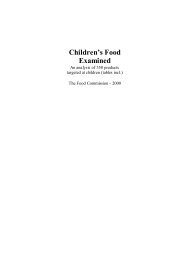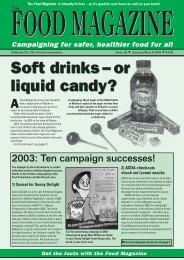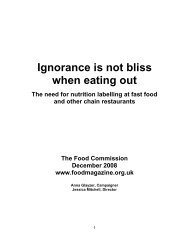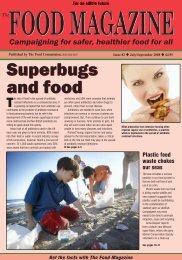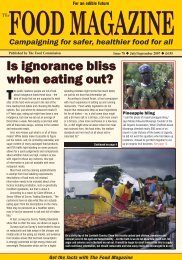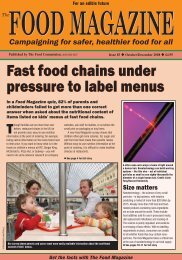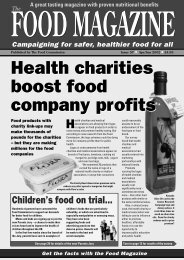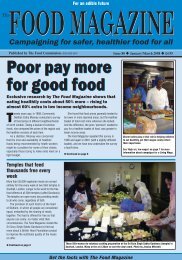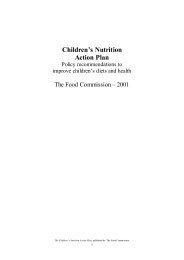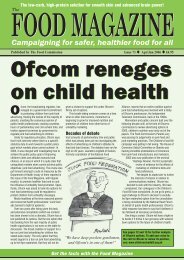Food Magazine - The Food Commission
Food Magazine - The Food Commission
Food Magazine - The Food Commission
Create successful ePaper yourself
Turn your PDF publications into a flip-book with our unique Google optimized e-Paper software.
society<br />
Nestlé’s unfair<br />
trade<br />
How the Nestlé executives must be laughing in<br />
their Swiss headquarters as the world of ethical<br />
consumerism ties itself in knots.<br />
<strong>The</strong> highly respected Fairtrade Foundation<br />
has a logo which it allows on products supplied<br />
by farmers paid a<br />
half-decent wage.<br />
Nestlé has launched<br />
a brand of coffee –<br />
Partners Blend –<br />
which, the company<br />
says, conforms to<br />
the fair trade<br />
principles, and the<br />
Foundation has duly<br />
allowed the logo<br />
onto the Partners<br />
Blend label.<br />
This has<br />
infuriated a sizable<br />
section of the ethical<br />
consumer<br />
community who<br />
believe that Nestlé's treatment of its third world<br />
workers is a scandal and that 99%<br />
of the company's coffee will still<br />
be unfairly traded – indeed, as<br />
one of the big three world<br />
coffee producers, Nestlé could<br />
be blamed for causing much<br />
of the unfair trade which the<br />
Fairtrade Foundation is trying<br />
to combat.<br />
<strong>The</strong> Foundation claims<br />
that its hands are tied,<br />
as it is required to judge<br />
the ethical trading<br />
compliance of a product,<br />
not a company. But a<br />
survey of Nestlé boycott<br />
supporters (who boycott<br />
Nestlé for its<br />
continued flouting of<br />
the Code of<br />
Marketing of<br />
Breastmilk<br />
Substitutes)<br />
indicates that<br />
many ethical<br />
consumers believe<br />
the Fairtrade logo<br />
endorses Nestlé the<br />
company, not just<br />
Partners Blend.<br />
For the record…<br />
This year alone Nestlé has been highlighted for<br />
its terrible record on workers’ rights. In July, a<br />
leading US human rights organisation (the<br />
International Labour Rights Fund) filed a lawsuit<br />
against Nestlé and two other companies for<br />
‘trafficking, torture and forced labour’ of children<br />
who cultivate and harvest cocoa beans that the<br />
companies import from Africa.<br />
In Colombia, there have been repeated<br />
murder threats made by paramilitary<br />
organisations targeting Nestle workers who have<br />
been trying to form a union. After a long and<br />
violent conflict Nestlé finally succeeded in<br />
destroying the trade union section in the milk<br />
powder factory Cicolac.<br />
And this September, in the Philippines, a<br />
trade union leader at the largest Nestlé plant in<br />
the country was murdered. Unidentified gunmen<br />
shot Diosdado Fortuna as he left the factory<br />
where he had been campaigning for two years<br />
for collective bargaining and pension rights.<br />
“D’you think we’re being unfair”<br />
GM animal feed<br />
<strong>The</strong> GM Freeze campaign and a coalition of<br />
campaign organisations has met with<br />
supermarkets and producers to discuss the<br />
possibilities of their removing all GM animal feed<br />
from their supply chains.<br />
<strong>The</strong> biggest market for GM products in<br />
Europe remains animal feed, mainly soya meal<br />
imported from the US and Latin America. Any<br />
increase in the planting of GM soya for animal<br />
feed would start to have an impact on the<br />
availability of non-GM soya derivatives in human<br />
food such as lecithin in chocolate and biscuits,<br />
which are by-products of the animal feed<br />
industry.<br />
<strong>The</strong> GM Freeze reports that whilst the<br />
relatively small Marks & Spencer has done the<br />
most and removed GM animal feed from much of<br />
its fresh animal produce (including milk, meat,<br />
fish and eggs), most of the others have gone<br />
only partially down this route. Indeed Tesco and<br />
Sainsbury’s are now telling their customers that<br />
the reason they have not gone further in their<br />
non-GM policy is to help hard-pressed farmers:<br />
‘<strong>The</strong> farming community have told us that to<br />
extend the range of meat we sell from animals<br />
fed on non-GM would put immense pressure on<br />
them' came Tesco’s reply to customer letter,<br />
received in July 2005.<br />
So what would it cost supermarkets to go<br />
GM-free Non-GM animal feed in the UK was<br />
only fetching around £5 per tonne premium last<br />
year. This is because soya and maize only make<br />
up a fraction of the ration of a dairy cow and<br />
other factors, such as labour, are far more<br />
significant in the total costs of production. This<br />
would mean an approximate 0.15 pence per litre<br />
increase if cows were fed a GM-free<br />
diet. Hard pressed dairy farmers may<br />
struggle to absorb such a cost but the<br />
highly profitable retail sector should<br />
surely be able to cope with it.<br />
Last year, Tesco sold 17% of the<br />
UK's liquid milk sales or 1.1billion litres<br />
per year – 30% of supermarket sales.* A<br />
0.15p per litre increase would cost the company<br />
approximately £1.65m. Sounds a lot but in the<br />
great scheme of things it amounts to only 0.08%<br />
of the pre-tax profit announced this year by<br />
Tesco (£2,029m). So by paying a small premium<br />
for non-GM milk, Tesco would protect farmers<br />
from further pressure, meet customer demands<br />
and the company could bask in the glory of a job<br />
well done.<br />
It won't escape the notice of farmers that the<br />
Chief Executive Officer of Tesco, Sir Terry Leahy,<br />
could cover the premium of non-GM milk out of<br />
the £3.19 million salary package he received last<br />
year, and still leave plenty to spare!<br />
* Figures from the Milk Development Council and<br />
Taylor-Nelson Sofres (TNS)



